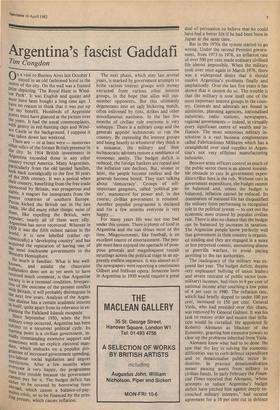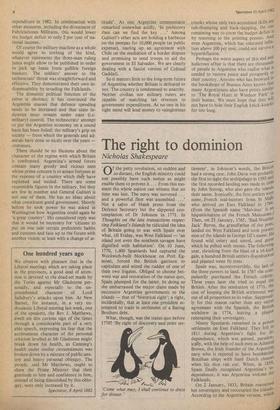Argentina's fascist Gaddafi
Tim Congdon On a visit to Buenos Aires last October I stayed in an old fashioned hotel in the centre of the city. On the wall was a framed Print depicting 'The Royal Hunt in Wind- sor Park'. It was English and quaint and must have been bought a long time ago. I have no reason to think that it was put up for rnY benefit. Hundreds of Argentine guests must have glanced at the picture over the Years. It had the usual commonplaces, with gentry in red hunting caps and Wind- sor Castle in the background. I suppose it was taken down last weekend. There are — or at least were — numerous other relics of the former British presence in the city. In 1914 British investments in Argentina exceeded those in any other country except America. Many Argentines, Particularly from the old landed families, look back nostalgically to the first 30 years of the 20th century. It was a period when their country, benefiting from the free trade sponsored by Britain, was prosperous and stable, a magnet for immigrants from the Poorer countries of southern Europe. Peron kicked the British out in the late 1940s. He did many other things; most of them, like expelling the British, were popular; nearly all of them were silly. Argentina has never recovered. Whereas in 1929 it was the fifth richest nation in the world, it is now labelled (rather op- timistically) a 'developing country' and has acquiacquired the reputation of having one of red most loathsome governments in the western Hemisphere. , So much is familiar. What is less well- known, and amidst the chauvinist hullabaloo does not as yet seem to have received much comment, is that Argentine society is in a terminal condition. Irrespec- tive of the outcome of the present conflict with Britain, it will probably disintegrate in the next few years. Analysis of the Argen- tine disease has a certain academic interest In itself, quite apart from its relevance in ex- plaining the Falkland Islands escapade. .S, Ince September 1930, when the first , "dutarY coup occurred, Argentina has been subject to a recurrent political cycle. Its starting „ rig point is a civilian government, in- 'tally commanding extensive support and sometimes with an explicit electoral man- date, which embarks on a populist pro- gramme of increased government spending, Pro-labour social legislation and import restrictions. After a few months when everyone is very happy, the programme runs into trouble because the government ea. nuot pay for it. The budget deficit has either to be covered by borrowing from abroad, which causes a balance-of-pay- Tn. ents crisis, or to be financed by the prin- ting Presses, which causes inflation. The next phase, which .may last several years, is marked by government attempts to bribe various interest groups with money extracted from various other interest groups, in the hope that allies will out- number opponents. But this ultimately degenerates into an ugly bickering match, often enlivened by riots, strikes and other miscellaneous nastiness. In the last few months of civilian rule everyone is very unhappy. There is a military coup and the generals appoint technocrats to run the country. By repressing the interest groups and being beastly to whomever they think is a nuisance, the military and their technocratic advisers restore a semblance of economic sanity. The budget deficit is reduced, the foreign bankers are repaid and the inflation rate declines. But, sooner or later, the people become restless and the generals become bored. They start talking about 'democracy'. Groups of self- important gangsters, called 'political par- ties', manoeuvre for power and, in due course, civilian government is resumed. Another populist programme is declared and for a few months everyone is very happy ...
For many years life was not too bad under this system. There is plenty of food in Argentina and the sun shines most of the time. Misgovernment, like football, is an excellent source of entertainment. The peo- ple must have enjoyed the spectacle of pom- pous generals and magniloquent rascals struttings across the political stage in an ap- prently endless sequence. It was almost as if the newspapers were reporting a continuous Gilbert and Sullivan opera. Someone born in Argentina in 1930 would require a great deal of persuasion to believe that he could have had a better life if he had been born in Japan at the same time.
But in the 1970s the system started to go wrong. Under the second Peronist govern- ment, from 1973 to 1976, an inflation rate of over 500 per cent made ordinary civilised life almost impossible. When the military took over once again in March 1976, there was a widespread desire that it should resolve Argentina's problems finally and emphatically. Over the last five years it has shown that it cannot do so. The trouble is that the military is now itself one of the most important interest groups in the coun- try. Generals and admirals are found in ministries, planning agencies, nationalised industries, radio stations, newspapers, regional governments — indeed, in virtually every significant centre of wealth and in- fluence. The most notorious military in- stitution is a vast business conglomerate called Fabricaciones Militares which has a stranglehold over steel supplies to Argen- tina's not very efficient manufacturing industries.
Because army officers control so much of the public sector there is an almost irresisti- ble obstacle to cuts in government expen- ditur0,13ut here is the rub. Without cuts in government expenditure, the budget cannot be balanced and, unless the budget is balanced, inflation cannot be reduced. Its. domination of national life has disqualified the military from performing its recognised role in the political system — to sort out the economic mess created by populist civilian rule. There is also no chance that the budget can be balanced by increases in taxation. The Argentine people know perfectly well that government in their country is organis- ed stealing and they are engaged in a more or less perpetual contest, amounting almost to guerrilla warfare, to avoid paying anything to the tax authorities.
The inadequacy of the military was ex- posed last year. The budget deficit, despite very unpleasant bullying of union leaders and severe restraint of public sector (non- military) incomes, had risen to 8 per cent of national income after touching a low point of 4 per cent in 1980. The inflation rate, which had briefly dipped to under 100 per cent, increased to 150 per cent. General Viola, who had presided over this chaos, was removed by General Galtieri. It was his task to restore order and ensure that infla- tion would be curtailed. He appointed Sr Roberto Alemann as Minister of the Economy, granting him extensive powers to clear up the problems inherited from Viola.
Alemann knew what had to be done. He saw that the key to solving the economic difficulties was to curb defence expenditure and to denationalise public sector in- dustries. In practice denationalisation meant passing assets from military to civilian hands. In early February the Finan- cial Times reported that Alemann, 'whose attempts to reduce Argentina's budget deficit have pitched him against deeply en- trenched military interests,' had secured agreement for a 10 per cent cut in defence
expenditure in 1982. In combination with other measures, including the divestment of Fabricaciones Militares, this would lower the budget deficit to only 2 per cent of na- tional income.
Of course the military machine as a whole would agree to nothing of the kind, whatever statements • the three-man ruling junta might allow to be published in order to pick up loans from gullible foreign bankers. The soldiers' answer to the technocrats' threat was straight forward and effective. They demonstrated their own in- dispensability by invading the Falklands.
The domestic political function of the move is obvious: it has convinced the Argentine masses that defence spending needs to be increased and that state in- dustries must remain under state (i.e. military) control. The technocrats' attempt to put the Argentine economy on a sound basis has been foiled; the military's grip on society — from which the generals and ad- mirals have done so nicely over the years continues.
There should be no illusions about the character of the regime with which Britain is confronted. Argentina's armed forces contain many greedy and vicious men whose prime concern is to amass fortunes at the expense of a country which they have exploited and misled. There are some responsible figures in the military, but they are few in number and General Galtieri is not one of them. He has no ideas about what constitutes good government. Shortly before he took power he was asked in Washington how Argentina could again be `a great country'. His considered reply was that it would be necessary for `citizens to put on one side certain prehistoric habits and customs and face up to the future with another vision, at least with a change of at- titude'. As one Argentine' commentator remarked' somewhat acidly, `In prehistory then can we find the key ...' Among Galtieri's other acts are holding a barbecue on the pampas for 10,000 people (at public expense), tearing up an agreement with Chile on the mediation of a border dispute and promising to send troops to aid the government in El Salvador. We are clearly dealing with a fascist version of Colonel Gaddafi.
So it matters little to the long-term future of Argentina whether Britain is defeated or not. The country is condemned to anarchy. Neither civilian nor military rulers are capable of matching tax revenues to government expenditures. As no one in his right mind will lend money to vainglorious crooks whose only two accredited skills are tub-thumping and back-slapping, the one remaining way to cover the budget deficit Is by resorting to the printing presses. And even Argentina, which has tolerated infla- tion above 100 per cent, could not survive a hyperinflation.
Perhaps the worst aspect of this sad and ludicrous affair is that there are thousands of people in Argentina who realise what Is needed to restore peace and prosperity to their country. Anyone who has browsed In the bookshops of Buenos Aires knows that many Argentinians also have prints similar to `The Royal Hunt in Windsor Park' 111 their homes. We must hope that they well not have to hide their English knick-knacks for too long.



































 Previous page
Previous page